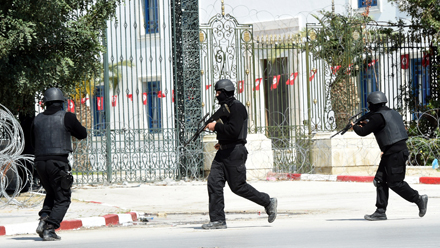British woman confirmed dead in Bardo Museum massacre
Tunisia 'at war' after two Tunisians and 17 tourists killed by 'terrorists armed with Kalashnikovs'

A free daily email with the biggest news stories of the day – and the best features from TheWeek.com
You are now subscribed
Your newsletter sign-up was successful
Tunisia's president has said his country is in a "war with terror" following an attack on a museum in the capital Tunis, which killed 19 people, including a British woman.
Two Tunisians, including a police officer, and 17 tourists died in yesterday's attack at the Bardo National Museum, one of Tunisia's most popular tourist attractions. A further 40 people were injured.
The Tunisian health minister confirmed this morning that a British woman was among the dead. The other victims included visitors from Japan, Italy, Colombia, Australia, France, Poland and Spain.
The Week
Escape your echo chamber. Get the facts behind the news, plus analysis from multiple perspectives.

Sign up for The Week's Free Newsletters
From our morning news briefing to a weekly Good News Newsletter, get the best of The Week delivered directly to your inbox.
From our morning news briefing to a weekly Good News Newsletter, get the best of The Week delivered directly to your inbox.
Two gunmen were killed by security forces, who are still searching for accomplices.
Tunisians have been out on the streets of Tunis to protest against the attack, lighting candles outside the museum and waving flags.
In a broadcast on national television, President Beji Caid Essebsi said: "These monstrous minorities do not frighten us. We will resist them until the deepest end without mercy. Democracy will win and it will survive."
The BBC's Arab affairs editor Sebastian Usher says the attack is a "huge blow" for Tunisia's government, which "only emerged at the end of a long political transition several months ago".
A free daily email with the biggest news stories of the day – and the best features from TheWeek.com
The incident began around midday, when gunmen stormed the Bardo Museum, sparking a three-hour hostage crisis.
The Tunisian parliament, which was debating anti-terrorism legislation at the time of the attack, was temporarily evacuated.
Karim Ben Sa'a, a tourism manager, said: "This is a black day for Tunisia… We are very sad for these tourists. They visit our country and it is so, so sad to see them die. Our hearts are black."
A spokesman for the interior ministry, Mohamed Ali Aroui, said the attack had been mounted by "two or more terrorists armed with Kalashnikovs". A museum employee told Reuters that the gunmen had "opened fire on the tourists as they were getting off the buses before fleeing into the museum".
The Bardo Museum is one of the most popular tourist attractions in Tunisia and is famed for its impeccably preserved Roman mosaics. The museum is set in the grounds of a 19th-century palace, a short tram ride from the centre of the city.
The attack poses an "early and severe challenge" for Essid, who took office as prime minister last month, The Guardian says.
About 3,000 Tunisians are believed to have returned home after going to fight in Syria, triggering concerns that former fighters could carry out attacks at home.
-
 The ‘ravenous’ demand for Cornish minerals
The ‘ravenous’ demand for Cornish mineralsUnder the Radar Growing need for critical minerals to power tech has intensified ‘appetite’ for lithium, which could be a ‘huge boon’ for local economy
-
 Why are election experts taking Trump’s midterm threats seriously?
Why are election experts taking Trump’s midterm threats seriously?IN THE SPOTLIGHT As the president muses about polling place deployments and a centralized electoral system aimed at one-party control, lawmakers are taking this administration at its word
-
 ‘Restaurateurs have become millionaires’
‘Restaurateurs have become millionaires’Instant Opinion Opinion, comment and editorials of the day
-
 Epstein files topple law CEO, roil UK government
Epstein files topple law CEO, roil UK governmentSpeed Read Peter Mandelson, Britain’s former ambassador to the US, is caught up in the scandal
-
 Iran and US prepare to meet after skirmishes
Iran and US prepare to meet after skirmishesSpeed Read The incident comes amid heightened tensions in the Middle East
-
 Israel retrieves final hostage’s body from Gaza
Israel retrieves final hostage’s body from GazaSpeed Read The 24-year-old police officer was killed during the initial Hamas attack
-
 China’s Xi targets top general in growing purge
China’s Xi targets top general in growing purgeSpeed Read Zhang Youxia is being investigated over ‘grave violations’ of the law
-
 Panama and Canada are negotiating over a crucial copper mine
Panama and Canada are negotiating over a crucial copper mineIn the Spotlight Panama is set to make a final decision on the mine this summer
-
 Why Greenland’s natural resources are nearly impossible to mine
Why Greenland’s natural resources are nearly impossible to mineThe Explainer The country’s natural landscape makes the task extremely difficult
-
 Iran cuts internet as protests escalate
Iran cuts internet as protests escalateSpeed Reada Government buildings across the country have been set on fire
-
 US nabs ‘shadow’ tanker claimed by Russia
US nabs ‘shadow’ tanker claimed by RussiaSpeed Read The ship was one of two vessels seized by the US military